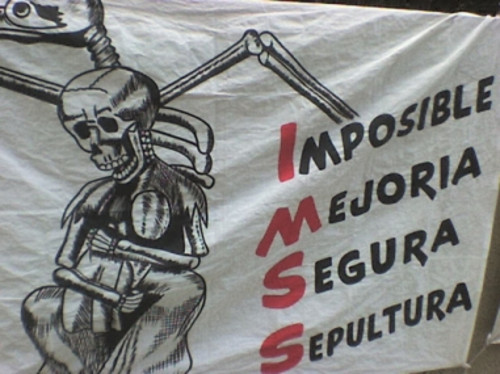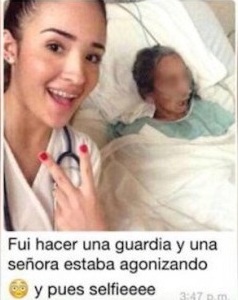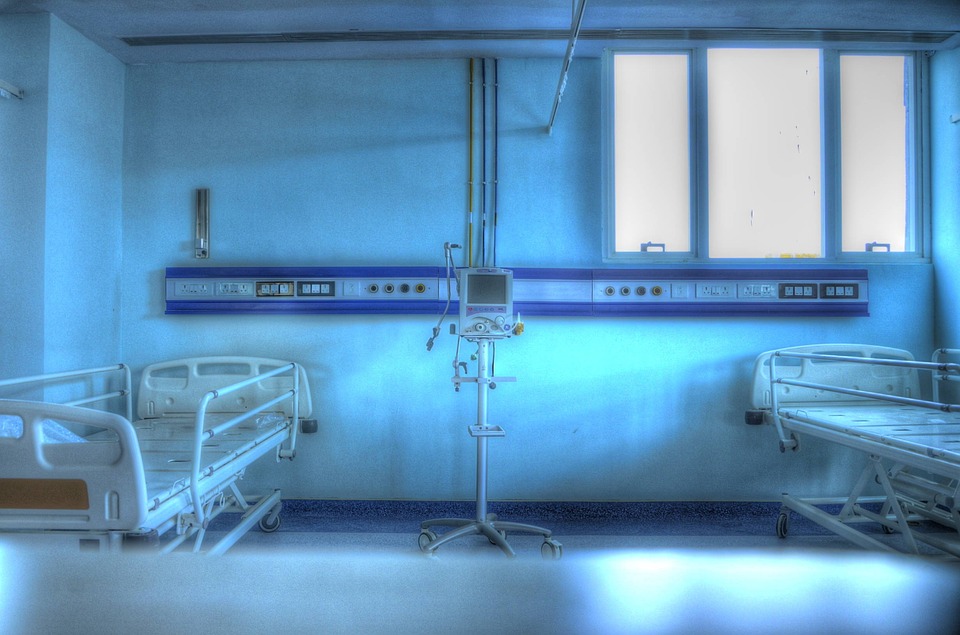Two years ago, when I was told that national healthcare insurance was now mandatory, I started looking for the cheapest health plan that would prevent me from being penalized. None of them were cheap – at least not for a full-time student working part-time. Right there and then, I wished we had a national healthcare system like the one in México. I always thought that having a government-funded healthcare system was the one thing that the Mexican government had done right.
The Mexican Institute of Social Security (IMSS) was founded in 1943, and according to its website, their mission is to “offer healthcare from the best medical professionals in the country and Latin America for the welfare of the Mexican society, with quality and kindness.”
Those last two words are the ones that bother me.
The view from inside
Before last year I had never been inside of any of the thirteen IMSS hospitals located in Cd. Juárez, except once for donating blood. But even then I was far from the hospital beds, far from the patients in them and far from their families who, sitting on blue, plastic chairs, patiently waited for the visiting hour.
But one day, last year, my mom called me and told me that my dad was hospitalized and that he would be having surgery. She told me not to worry. The doctor had said that he would remove a “small, benign tumor” from his bladder. The doctor told us later that the tumor was bigger than expected and that my dad would need another surgery to remove the rest of it. He told us the same thing after the second surgery.
A month later, they told us that the surgery had been successful; that everything was fine but that my dad still needed to go to checkups. After the first checkup, they told us he had cancer. He was assigned to an oncologist and started chemotherapy and radiotherapy, both covered by IMSS.
The following months were all part of a painful rollercoaster. The oncologist, who rarely left his office to see his patients, told my mom that he couldn’t do anything to help my dad, and that “he would die soon.” That last part is between quotation marks because that’s exactly what he said, no “ifs,” “buts,” not even “I’m sorry.” He said this, according to my mom, before shutting his office door. My mom later learned from another patient’s wife that that oncologist was known for being cold and rude, and that he always said that his patients were terminal even if they were not. So there was still hope.
Taking charge when caretakers fail
Months later, my dad finished chemo. After two subsequent surgeries, the cancer was gone. But something was still wrong. He went back to the hospital several times, and none of the doctors (if we were lucky enough to talk to them) could tell us what was wrong exactly. Tired of the situation, my mom hired a private doctor to see my dad, and when the IMSS specialist in charge of my dad’s case learned about this, he said he would withdraw from the case. Apparently he was offended that we wanted to seek a second opinion. We did it anyway.
The private doctor told us that the specialist had not been handling the case correctly and that it was better for my dad to be taken to another institution. We just had to wait until my dad was stable enough to leave the hospital. That was the plan.
A week later my dad had to undergo emergency surgery. The next time I saw him he was not himself anymore. His condition was clearly serious. My sister and I noticed that the intravenous solution bag was empty. My sister, being a doctor, changed it. Fifteen minutes later the bag was empty again. We had been there for half an hour and no nurse or doctor had come to check on my dad. My sister changed the bag again, and when the bag was about to empty for the third time, I looked for the nurse in charge.
I found her chatting with a colleague. When I asked her why nobody had checked on my dad, she rolled her eyes and did not say a thing. She finally changed the bag and lectured me about how many patients she had and that, since there were two of us in the room with my dad (one of the rules of the institution is that there should only be one person with the patient), we had to change the bags ourselves. She was mad for being asked to do her job.
When I told my mom about the situation, she told me that the nurses were almost never there to change the bags. She had been doing it herself and my dad too, before he was too ill to do it (I wondered who changed the bags for the old man on the bed next to my dad’s, who never had visitors). I was outraged. I was ready to file a complaint, until I was told that I had to wait until the next morning to do it.
I would have filed that complaint hadn’t my dad died just hours later.
Human rights horror stories
Recently, I learned that for the past five years, IMSS has been the national institution with the greatest number of claims made against it before the National Commission of Human Rights (CNDH). Before that, it had been number two. According to the CNDH annual reports, most of the complainers accused IMSS of failing to provide appropriate medical care and even of being responsible for the death of patients. I wasn’t surprised.
Every month there is a new tragedy involving IMSS. A few months ago the news was about the thirteen babies who died in one of the IMSS hospitals in Culiacán, Sinaloa, presumably due to the Klebsiella bacteria, which affects newborns whenever they are exposed to unsanitary conditions. The month before that two medical interns in Saltillo, Coahuila, lacerated a baby’s penis when they confused it for the umbilical cord. And just two weeks before that one, IMSS made it to international news when one of its ophthalmologists in Cd. Obregón, Sonora – who had been accused of negligence in the past -, removed the wrong eye from a baby, leaving him blind.
As I said before, this doesn’t surprise me. Those of us who grew up in México have heard at least one person complain about how long it took IMSS to schedule an appointment, and that when they final got it, it was too late. It is always cancer. When I was a kid, every time a classmate said that his or her grandparent was hospitalized in IMSS, for some reason they never made it out. Not for nothing there’s a popular phrase that has been around for years, which plays with the IMSS acronym: Imposible Mejoria, Segura Sepultura (impossible recovery, guaranteed burial).

Where is the compassion?
What really surprises me is the lack of empathy of some of the medical personnel towards their patients, their insensitive handling of the pain of others. I can’t really say if this is the way it has always been (like I said, I had never spent time in a hospital until my dad became ill), or if it only happens in public hospitals, but isn’t medicine a career that demands, above all, humanity? Aren’t our doctors and nurses supposed to take an oath on graduation day, promising to remember that “warmth, sympathy, and understanding may outweigh the surgeon’s knife or the chemist’s drug?” They do take the oath, in front of their families and friends who applaud them, trusting they are ready to save the world.
I’ll be honest; maybe I expect doctors and nurses to be heavenly beings when they are only humans. But still, I believe medicine is a career not everyone can practice, and it is that way for a reason.
Two months ago, a national discussion about medical ethics went viral after a medical intern took a “selfie” with a dying woman, labeling it “during my shift a lady was agonizing. So selfie,” and published it on social media. The same happened with a nurse who took a “selfie” with an old man while in the emergency room. The latest case involves another medical intern, who took a picture of the genitals of his patient, a minor, and made fun of it on Facebook.

For me, the discussion had started months earlier, when a doctor who I have as a Facebook friend made fun of the ignorance of one of her patients who asked her when would her diabetes be healed. She published it on Facebook, and people “liked” it and laughed about it as if they had been told about a 4-year-old asking whether the moon is made of cheese.
I am aware that these cases might be part of an isolated incident; however, shouldn’t we wonder whether something is wrong with the system? Shouldn’t doctors, nurses, and professionals who work in the medical field be trained to sympathize with their patients and respect them? Shouldn’t they be taught that, for centuries, medicine has been the most respected career for a reason?
Last summer, I went on a field trip to the Federal Courthouse with a group of pre-law students. We got to see criminal and civil trials, as well as deportation hearings. We were advised by our professors that the latter would be tough and depressing. And they were.
What struck me the most was not the line of people in orange jumpsuits, sitting all in a bench, with their hands and feet chained together, waiting for their turn to see the judge. It was how their attorneys, most of whom were doing pro bono work, took care of them while facing the judge. I remember in particular an attorney who, while speaking to the judge, held her 22-year old client’s hand. She held it even tighter whenever the young woman started to sob. This lawyer did not let go of her client’s hand even when the woman knelt in front of the judge, asking for the judge’s and the county’s forgiveness.
When the hearings were over, the judge came to talk to us and told us, with a raspy voice and blood shot eyes, that the hardest part of his job was to see people kneel before him and not being able to console them.

So I know it is not much to ask doctors and nurses for humanity. I saw it in a place where one wouldn’t expect to see it, offered by people who are often considered cold-hearted and even malicious. Why, then, shouldn’t I ask to see it in a place that probably needs it the most?
I do respect medicine and those who know how to practice it. Many of my friends and loved ones are doctors or nurses, and I do not doubt that most of them have the knowledge to do their job. I’ve seen their 50-page long study guides. I’ve seen them do homework until 3 a.m. I’ve seen at least one of them get home after a 48-hour shift, greeting us with a smile because she is too tired to say “hello.” I believe they have the needed knowledge, and I hope they have the needed hearts.
For my sister I only have one bit of advice, even though I know she doesn’t need it: always treat them as if they were dad.


